SLP Students Just Wanna Have Fun!
 |
About the presenter: Russ Hicks has stuttered significantly all his life. He lives in Dallas, Texas, and joined the National Stuttering Association in 1985 and Toastmasters in 1988. He has had great success in Toastmasters, winning the Southwestern United States Regional Humorous Speech Contest in 1996, and is currently a DTM, a Distinguished Toastmaster, the highest rank in Toastmasters International. He founded the Callier Communicators Toastmasters Club in Dallas, the first Toastmasters club in the world devoted exclusively to people who stutter. He is a past president of the Dallas Chapter of the NSA. Russ was the NSA national Member of the Year in 2000 and serves as a webmaster for the national NSA website. He has a personal home page at www.russhicks.com |
SLP Students Just Wanna Have Fun!
by Russ Hicks
from Texas, USA
Well surprise, surprise! Who doesn't wanna have fun? People who stutter certainly do. SLP professors and teachers do too. And of course students do. You learn when you have fun. Have fun FIRST, and the learning inevitably follows.
The Project
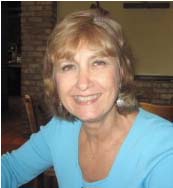 Several years ago my friend Jan Lougeay who is the instructor for the stuttering course at the University of Texas at Dallas, UT/D, had a brainstorm.
Several years ago my friend Jan Lougeay who is the instructor for the stuttering course at the University of Texas at Dallas, UT/D, had a brainstorm.
She wanted her students to get some real life experiences with adults who stutter. She also realized that the Dallas Chapter of the National Stuttering Association, the NSA, met in the same building as her classes. Her students are generally either first or second year graduate students. They either knew the fundamentals of stuttering or were completely new to stuttering. How could she integrate the Dallas NSA with her students?
For several years Jan has required her students to attend at least one monthly meeting of the Dallas NSA or our Toastmaster meetings. Those visits by her students were a huge success both for them and for us. They learned a LOT during our meetings (typical comments were "You all stutter so differently!" and "That was so much fun!") and we thoroughly enjoyed having them at our meetings. They added a new dimension to our discussions on stuttering.
Could we even improve on this? Jan got with us and asked if we would like to participate in a new project she had in mind. Of course! It sounded like fun.
So Jan decided she wanted her students to pretend they knew what they were doing and "interview" a member of the Dallas NSA as if that person had walked into the speech clinic and asked for help with their stuttering. Students ask questions similar to those that would be asked during a speech evaluation. When the interview is completed, the NSA member evaluates the student's interactive skills and provides feedback about how to improve from the perspective of a person who stutters. The student is not graded based on the evaluation, but on a paper written later describing what was learned from the experience. By participating in the project, NSA members help to ensure that the speech language pathologists of the future are skilled in their clinical interactions with individuals who stutter.
Here are some of the questions she uses:
- When did you begin to stutter? How has the way you stutter changed over the years?
- Does anyone else in your family stutter?
- Have you ever had therapy? What did the therapy consist of? How effective do you think it was?
- Has your stuttering changed or caused you more problems recently? Why did you come for help at the present time?
- Are there times or situations when you stutter more or less? What are they?
- Have your academic/vocational choices and/or performance been affected because you stutter? How?
- Have your relationships with people been affected? How?
- What are your attitudes and feelings toward your stuttering? What do you think other people think about your stuttering?
- Are there any additional things that your think we ought to know about your stuttering?
The actual answers to these questions are really not important in the mock interview. The questions, however, provide perfect springboards for discussions of stuttering.
She passed out these questions to her class as well as a list of NSA members and our email addresses. Each student was encouraged to select an NSA member to interview. It was up to both the student and the NSA member to arrange a meeting time and place for this interview. Jan suggested a half hour at the clinic or maybe even coffee at a local Starbucks. Whatever works.
Typically there are more students than there are members of the Dallas NSA, so those of us who wanted to participate in this program generally got picked by several students.
My Involvement
I've participated in this program for about six years now and generally I am interviewed by anywhere from 5 to 15 students each year. And I love it! The students email me to introduce themselves and to set up a date and time for the interview. I've discovered that it's a lot of fun to meet for lunch at Chili's or la Madeleine (local restaurants here in Dallas) or anywhere else they would like. This year a student originally from Iraq took me to lunch at a Middle Eastern restaurant and that was amazing! We've met at Starbucks in the fabulous Children's Hospital and even met in downtown Dallas at the West End Marketplace. We've met in the Student Union of UT/D and at the Callier Center (the speech clinic). We've found that the more exotic the place, the more fun we have!
Here are some pictures of some of the students I've interviewed:
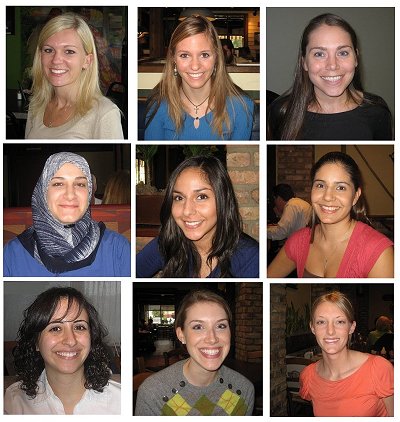
Some of Jan's students from 2007 and 2008
The Interview
Jan suggests a half hour interview, but we generally have way too much fun to stick to that short time. We just don't tell her how long we took!
Here are some of the questions on the evaluation form we use to provide feedback to the students on how well we think they did:
- Did your clinician make you feel comfortable?
- Was she a good listener?
- Did she communicate with you effectively?
- Was she well organized and prepared?
This feedback form is strictly between us and the students. We give the students any form of feedback we choose. And typically they learn they are a lot better than they think they are!
Student Comments
Here are some comments from the students extracted from some of their final papers submitted to Jan:
- Overall, I learned that good stuttering therapy is a very involved process and a caring, educated therapist can really make a difference in the life of a person who stutters.
- I learned from him in two hours more than some of my classes in an entire semester.
- Talking with him really also helped me realize how important the underlying feelings are when it comes to making decisions about the types of therapy you do with a client. Motivation and emotions are huge parts of the therapy process and it is extremely important to understand the client's underlying emotions and their motivation to participate in therapy in order to develop the most appropriate therapy plan for their individual lifestyle.
- The feedback I received from the client was priceless and will help me hone my listening skills even more.
- I thoroughly enjoyed this experience and found my interview with him to be not only extremely informative, but also eye-opening to listen to stuttering from his perspective.
- I came away from the meeting with a new understanding of stuttering, a connection to the stuttering community and encouragement to be of help to people who stutter in the future.
- I learned a lot from the person I interviewed. He gave me advice for the future when working with people who stutter, showed me that there is no reason to be nervous when talking to people who stutter, and gave me new insight into some of the struggles people who stutter may have to deal with.
- This was probably the most valuable learning experience regarding speech pathology that I have had thus far.
Involvement of the Dallas NSA
But the fun really doesn't stop there. We have a small group, typically four or five people, in the Dallas NSA called our "Chat and Chew" group which meets once a month and is really a social "hang out" session at a local pizza parlor. We talk about everything and anything at these meetings. Guns, motorcycles, politics, religion, girls (hey we're mostly guys!), astronomy, and even sometimes stuttering! It's a totally unstructured meeting and is designed to give us as much "real world" social experience as possible. (Think cocktail party.) We have a lot of fun at these meetings. One of our traditions is that we give free pizza to first time attendees.
But this group qualifies as one of Jan's required meetings for her students. And a couple times this year we've been inundated by a tsunami of SLP students flooding into the pizza place! One time we had five Dallas NSA members and over 30 student SLPs join us! We lost count! It was a near riot! We quickly divided ourselves into one NSA member for every five or six students. We, the NSA members, rotated several times so everyone got to talk at least briefly with everyone else there. Jan was horrified that this happened, but everyone else LOVED it! Especially the owners of the pizza place!
Here are some pictures of some of our tamer visits:
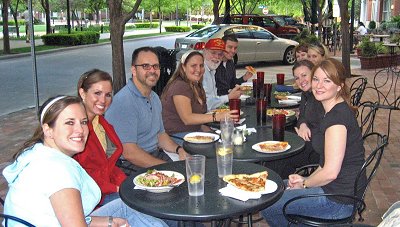
Chat and Chew Meeting -2006
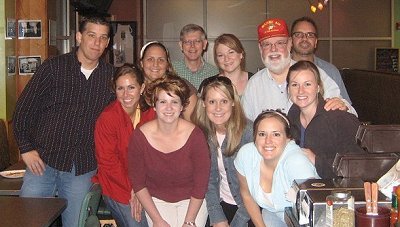
Chat and Chew Meeting -2007
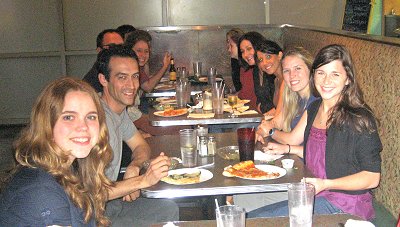
Chat and Chew Meeting -2008
Everyone has a BALL these meetings! And yes we even really do talk about stuttering -as well as school, jobs, marriage (one student brought her fiance), and of course motorcycles and guns.
FUN as People, Not Just Clients
The upstart of all this -besides the FUN involved -is that the students really get to know us as PEOPLE, not as disembodied voice boxes in their text books. And we get to know them too. From our perspective, it's amazing to see the quality of student SLPs coming out of school these days! They are the future of the speech pathology profession and will help our children and grandchildren. And what a bright future it will be! As they get to know us as people, they're really beginning to "get it" when it comes to stuttering. Because they know us, they can honestly tell the children they will be working with that they know people who stutter who are doctors, lawyers, aircraft designers, printers, salesmen, computer systems specialists, teachers, bankers, butchers, bakers, and no doubt candlestick makers. Stuttering is really NOT a limitation!
You don't get this in-depth knowledge out of reading it in textbooks. You get it by getting to know people who stutter on a personal basis and have FUN together!
Cautions and Limitations
Anything has risks involved. While hooking up students with serial killers is not a recommended practice, there are security concerns. The professor must have a good working relationship with the potential interviewees. Jan has a wonderful and long term relationship with the Dallas NSA and she knows the people her students will be talking with. Such knowledge is, of course, essential in doing this project.
The real gating item in this entire project is the availability of interviewees. If you are a person who stutters and/or a member of a local NSA chapter, your availability and participation is critical to the success of this project.
Call to Action!
- SLP teachers and professors: Contact your local NSA chapter and actively work with them. The NSA website at www.WeStutter.org lists all the chapters in the US. Set up a program like Jan did in Dallas. It's one of the most valuable experiences your students will ever have. Jan's email address is lougeay@utdallas.edu.
- People who stutter and NSA chapter members: Get involved with this project! Make yourself available and enjoy getting to know the wonderful student SLPs in your area. The experience you give to the students cannot be duplicated in text books. You are a vital ingredient in this entire process. You will be helping them more than you can possibly imagine. And believe me, you'll have fun too!
- Student SLPs: Don't be afraid of this project. If your teacher makes this a part of your class, enjoy it! You'll be glad you did. And HAVE FUN!
I welcome your questions and comments. Let's have fun together!
DATE SUBMITTED: August 8, 2008

